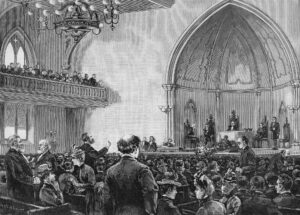In his 2017 book Cheap Sex, Catholic sociologist Mark Regnerus conducted a massive study of intimate relationships across America. His findings, while illuminating, were grim. He showed how technological changes, first in the form of the contraceptive pill and then in the form of freely accessible high-definition pornographic content, had radically altered the mating market, or what we might call the sexual economy.
One of the most striking findings was that the use of pornography among men seemed to have jumped by as much as 30 percent between just 1992 and 2014. Other recent studies show that the age of first exposure has gotten younger, the nature of the material has become more extreme, and attitudes about it have relaxed. I thought things were bad in those early days of the internet, but in reality this issue has only gotten worse.
For Christians the issue is both simple and complex. Simple because Christians know: porn is bad. Complex because so many Christians continue to struggle with porn, and many do not understand how and why it is so insidiously destructive. In an age when almost all moral reasoning is boiled down to the question of whether anyone is harmed, it’s possible for even Christians to be deceived into the posture of shrugging and saying, essentially, “it could be worse.” In fact, as recently surfaced in a clip of Jordan Peterson’s Exodus discussion series, this is exactly the attitude of some cultural conservatives.
There is no level of analysis at which pornography reveals itself to be anything but an unmitigated disaster.
Many others have written powerfully about the spiritual impact of indulging in this kind of sexual sin. For example, Tim Challies has insightfully laid out 8 sins you commit whenever you look at porn, and 5 ways porn lies to you. (The fact that these posts are consistently among the most popular on his blog says something about the perennial relevance of this topic). Jonathon Van Maren has written memorably about the terrible human cost.
I commend these reflections heartily. But in this piece I’d like to take a slightly different approach and consider more generally how pornography poisons everything it touches, individually and corporately, inside the church and out. This will be followed up by a part two where we’ll get into the specifics of what steps Christians can take to break free of porn’s grip.
Pornography Poisons Everything
There is no level of analysis at which pornography reveals itself to be anything but an unmitigated disaster.
Every person associated with it, from the models and actors to the photographers and film editors to the distribution companies and payment platforms to the witting and unwitting consumers and then radiating outwards to each of their families and networks of relationships; every person in that inseparable web is harmed and debased (though not in equal measure) by their association with pornography.
It is not unlike radioactive waste. There is no safe way to carry plutonium in your pocket, no harmless way to keep some in your bedroom. Anyone who comes into proximity with it will be bombarded with gamma rays that will smash into their skin cells, their organs, their brain, causing invisible but very real damage. The writer of Proverbs, in a still more striking image, asks “Can a man carry fire next to his chest and his clothes not be burned?” (Prov. 6:27).
In a million ways that are real but impossible to measure, pornography poisons everything it comes in contact with.
SIDEBAR: “How many engagements have been broken off by the revelation of an intractable addiction to pornography?”
The husband who looks at porn becomes a different kind of husband; the teenager’s imagination is filled with the perversions of others that quickly become his own; the young woman absorbs twisted notions about her role and demeanour in sex.
From these undeniable effects come a series of troubling questions: How many engagements have been broken off by the revelation of an intractable addiction to pornography? How many promising romances never got started because the secret guilt of pornography robbed young men of the courage and confidence needed to pursue a young woman?
How many marriages never made it to the 5th, 10th, or 25th anniversary, the union succumbing to the gangrene of porn? How many pairs of eyes failed even to look up into the eyes of another person, cast downward by the shame of the filth they recently had been gawking at?
These costs are not measurable, as the Preacher wrote: “what is lacking cannot be counted” (Eccl. 1:15). But the costs are nevertheless real, and our families, churches, and communities are far poorer for it.
For the church to try and advance our kingdom mission while leaving pornography unchallenged in our lives is like trying to go on a long drive in a vehicle that’s missing a sparkplug – it’ll sputter forward, but only slowly and painfully.
Or to use an image more familiar to Scripture, it is like feeding our bodies a diet that includes lead and mercury and expecting to be in great health. In short, pornography poisons everything, and this is obvious both from a cursory reading of the Bible and from common sense observations.
What about those who defend porn?
Some argue that porn use is the harmless expression of pre-existing sexual desires and proclivities, but this is dangerous drivel. Pornography shapes and awakens desires and literally rewires the neural pleasure pathways in the brain through the powerful stimuli of arousal and release.
Then the law of diminishing returns nudges users towards ever-more extreme material, desensitizing them to perversions and violence. The Biblical principle here is that we become what we worship (see Psalm 115:8). And make no mistake: any habitual usage of pornography is liturgical, it is very much worship.
Many people today try to downplay the problems with pornography, either because they are afraid of looking like sexually repressed prudes or because they know that the only moral prohibition left in our culture is that of having any moral prohibitions.
But there are ways to restore a measure of moral clarity. One is to ask: “Do you have any daughters? Sisters?” The point makes itself: good parents and siblings do not want their daughters or sisters featured in porn. They may parrot the absurd idea that porn is empowering for women, but more telling is the fact that in the history of the world not a single good father has wanted his daughter to become a prostitute, stripper, or porn actress.
Why?
Because everyone not deceived by ideology knows it is inherently debasing and demeaning to the worth and dignity of one’s person and body. And despite the now sixty-plus years of propaganda celebrating sexual liberation, there is enough residual common sense in the average person for this to be clear.
Pornography, especially in the digital age, is an unmitigated disaster for every level of society: from the inner person, to the intimacies of the home, to the integrity of churches, to the health of civilizations.
Therefore the men who defend porn are saying they don’t want their daughters dehumanized and objectified to satisfy the lusts of other men, but they do want other men’s daughters to do it: Let it be someone else’s daughter or sister that is taken advantage of, but not mine. God speaks to this vile hypocrisy in Hosea 4, in what is a haunting passage:
“I will not punish your daughters when they play the whore,
nor your brides when they commit adultery;
for the men themselves go aside with prostitutes
and sacrifice with cult prostitutes,
and a people without understanding shall come to ruin” (Hos. 4:14).
From this single verse we learn that men are especially accountable in this domain, that their lusts spill over into the lives of their daughters and wives, and that a society given over to this kind of sin is “without understanding” and will “come to ruin.”
Who can deny that we are already living in those ruins?
Pornography in the Public Square
We are at a cultural turning point. The veneer of consequence-free sexual pleasure has worn off to reveal something ugly. Like the haggish face of a former beauty who has gotten a few too many surgeries and Botox injections, the sexual revolution has not aged well. And Christians are not the only ones noticing.
A number of articles and books have recently emerged from all over the political and cultural spectrum offering substantial critiques of pornography and the sexual revolution. This is instructive about how the culture is assessing the legacy of that so-called liberation, and I believe it represents an opportunity.
Christians should be clear and unapologetic about these moral questions, working not only for purity in our families and churches but advocating for common-sense moral and sexual sanity in the public square. For example, there was a recent state law passed in Louisiana requiring verifiable ID to access adult content.
Will that solve everything? Of course not. But it is undeniably a significant step towards protecting children that should be adopted by more jurisdictions. Another example is lawsuits brought against porn companies like MindGeek, including a class-action suit seeking 600 million dollars led by a woman who claims a video of her being sexually assaulted while she was a young teenager was distributed by the site. A few moments of research reveal that there are countless examples like this. Public sentiment is shifting thanks to the tireless efforts of brave activists like Laila Mickelwait of traffickinghub.com.
Christians should make the case for these kinds efforts, but not expect to convince everyone. Why? Because a vision of moral sanity oriented to the transcendent goodness, beauty, and truth of God’s nature will by definition feel oppressive to people in rebellion against that God. And given the fact that our culture is so profoundly deceived on the question of sex, there will be significant pushback.
But as James Wood has rightly pointed out, “You cannot claim to love your neighbour while remaining indifferent to the things that destroy them.” Let us not be surprised then when those without Christ claim that any constraint against their personal choices is oppressive and harmful.
There are countless ways to make these kinds of arguments, but here is an example of a natural law argument that I think helps us think more deeply about why pornography and sexual sin is wrong. I came across this a little book called Beauty, by Roger Scruton:
The old morality, which told us that selling the body is incompatible with giving the self, touched on a truth. Sexual feeling is not a sensation that can be turned on and off at will: it is a tribute from one self to another and—at its height— an incandescent revelation of what you are. To treat it as a commodity, that can be bought and sold like any other, is to damage both present self and future other. The condemnation of prostitution was not just puritan bigotry; it was a recognition of a profound truth, which is that you and your body are not two things but one, and by selling the body you harden the soul. And that which is true of prostitution is true of pornography too. It is not a tribute to human beauty but a desecration of it.
What strikes me about this passage is its self-evident truth.
Scruton makes the same point that Carl Trueman has been making in his recent work, that we must not separate our bodies from our concept of the self – “you and your body are not two things but one.” That would be a kind of Gnosticism, a rejection of the physical as inherently bad. But Christian spirituality, though it certainly transcends the material, is never pitted against it. The physical embodied aspect of our nature is not accidental; God is on record calling it “very good” (Gen. 1:31).
Then Scruton notes that pornography, while claiming to be a kind of tribute to human beauty, is really the opposite: a desecration. But for something to be desecrated, it must first have some innate sacred value.
This raises a question at the heart of so much cultural conflict: can anything be sacred in a secular world? And if yes, how can we agree on what that is? Interestingly, Scruton deftly sidesteps the issue and states plainly what most people know intuitively – yes, there is such a thing as the sacred. He is right, of course: the human person, body and soul, is sacred. But it is instructive that even in a book published by Oxford University Press he could assume the sanctity of the human person.
It is likely the same with our friends, neighbours and coworkers. With the shine wearing off the false promises of sexual liberation, these kinds of arguments, and others like them, may find more traction than we expect.
What about within the church?
We spoke of those who defend pornography in our culture, but within the church, porn has no defenders – only conflicted and struggling users. This requires some careful pastoral work. As Ray Ortlund points out in The Death of Porn, a powerful little book about this topic, users of porn are both perpetrators and victims, sinning and sinned against.
By their participation they victimize women and create demand for more victims of sexual trafficking and exploitation, while at the same time they themselves are deceived and enslaved by an industry that exists to deceive and enslave. Did I mention that pornography poisons everything? There is guilt enough to go around.
For most men (and many women) in the church the question of pornography is hardly academic or abstract. Rare is that man for whom the scourge of porn has not left at least some scars or wells of shame. I am no exception. Like so many of my generation, coming of age during the internet’s explosive growth, I spent some of my teenage years ensnared and enslaved to the lure of online pornography.
By God’s grace he set me free by the power of the gospel soon after I came to Christ at the age of 19. But it took a number of years to unearth the depth of pornography’s impact on my mind and heart, and years more to undo the damage it had wrought in me and in my marriage.
And so it is with inside knowledge that I can confidently assert the following: pornography perverts the mind and heart of the consumer in profound and pernicious ways. And frankly, denials of these effects only serves to underline their inherent deceitfulness. You may think porn isn’t affecting you, but you’re dead wrong.
The reality couldn’t be more clear. Pornography, especially in the digital age, is an unmitigated disaster for every level of society: from the inner person, to the intimacies of the home, to the integrity of churches, to the health of civilizations.
Having laid this groundwork, in a follow-up article I’ll speak more directly to those struggling with the temptations of pornography. But here’s a teaser: in Christ we find all we need to fight this battle on every front, for by the power of his indestructible life he defeats both the penalty and power of sin.
























